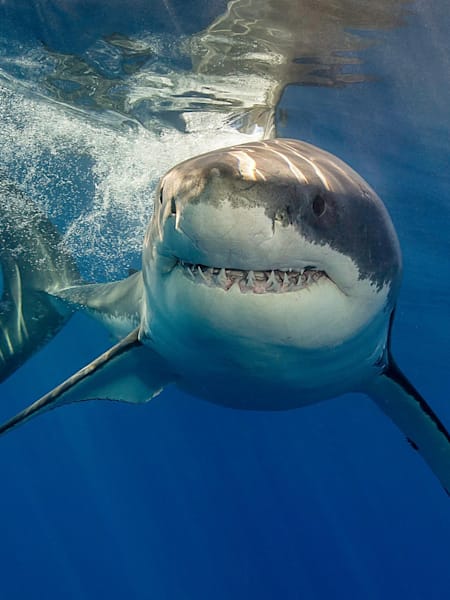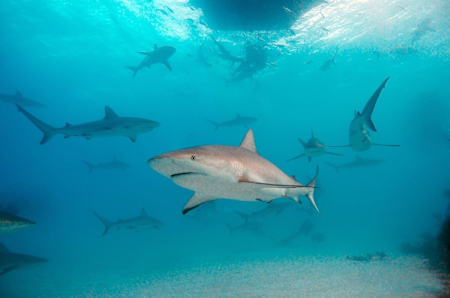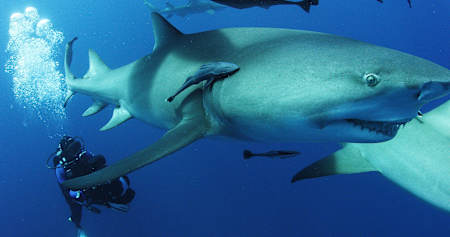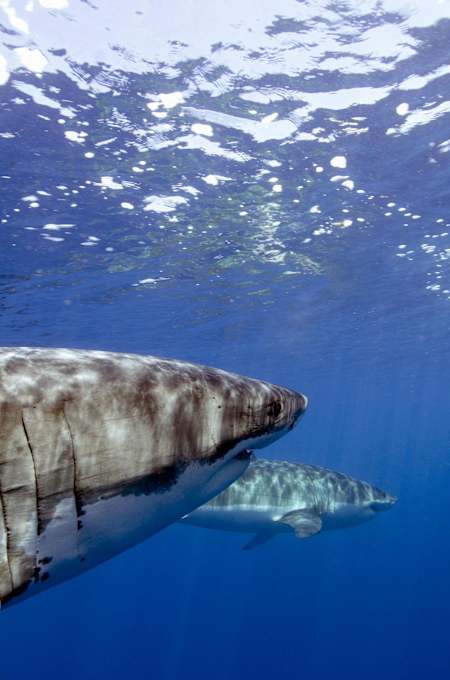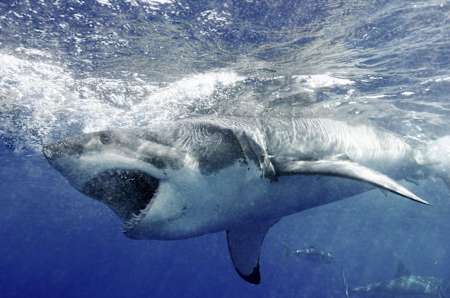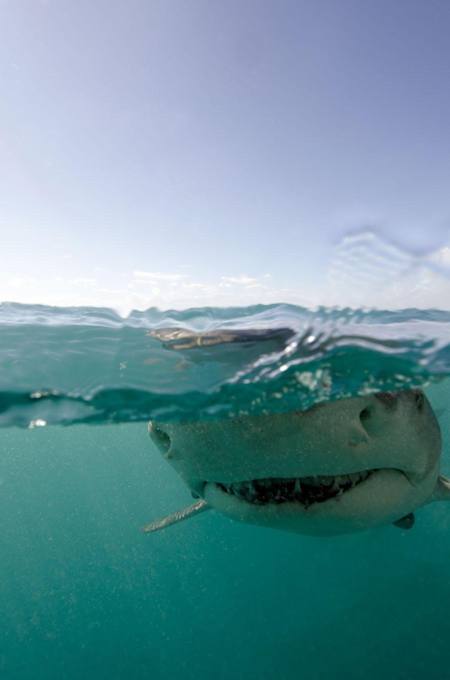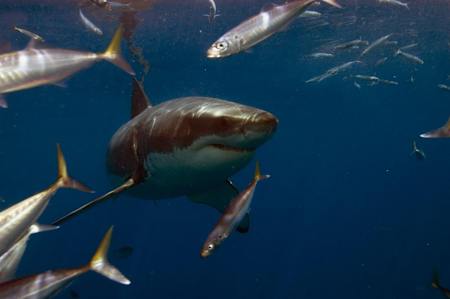For some individuals, swimming with massive sharks is not just a nerve-jangling past-time but an actual career. Underwater photographer Will Allen has built his by getting up close and personal with all manner of shark, including apex predator great whites. He started down this road when National Geographic photographer Emory Kristof told him he needed to make his photos stand out, and has since worked with the late Rob Stewart to film groundbreaking documentaries including Revolution and upcoming film Sharkwater Extinction.
Naturally, if you enter the waters of a great white without a cage then you put yourself at risk, but if you follow these handy tips from Allen you may just live to tell the tale...
1. Remember you're in their territory
"We, as shark diving professionals, are always aware of our surroundings. We know we are in their element, not mankind's. So if you're in the ocean and a shark swims up to check you out you should never really be that surprised, they live there.
"The main thing to recognise is that they aren't interested in us. They are curious, but the last thing a great white shark wants to do is get hurt, just like any other living creature. They have to heal on their own with no aid of doctors or medications.
"They seem like a big scary creature because of what we as humans have portrayed them as, but they are just a big fish at the end of the day. A very badass big fish, admittedly, but they are vulnerable at the same time and have zero interest in putting themselves in harm's way."
2. Remain zen at all times
"I just focus on what I'm about to do. I don't think of anything else going on in my life, or the world – I focus on the water and the sharks. I'm like that before I do any dive, really. To me, there are few places I'd rather be than in the ocean swimming with sharks and other sea life. The only thing that has made that place better for me is having my fiancee join the dive. Swimming with sharks causes me to be hyper aware and reminds me how insignificant we as people really are.
"Everything kind of slows down underwater, and everything gets very focused. You've got to pay attention at all times, but it's like a meditation. It becomes peaceful. You can have 17ft great white shark in front of you and not feel afraid."
I snap a few photos, and it comes even closer. It's not even swimming any more; it's just kind of stopped in front of me with its body half-cocked. I'm like, 'Oh, I'm so dead.' I'm so nervous at that point that I'm breathing super-rapidly.
3. Learn to stand your ground
"For me there are two moments from diving with great whites that stand out the most. The first is when I had a face-to-face stand off with one at 80ft on a filming platform. A big one was circling me and then decided to just stop and stare me down. It seemed like several minutes, however I'm sure it was only several seconds. But the shark wasn't budging and I was quite nervous. This was one of my earlier dives with great whites so the adrenaline was quite high and my heart rate was up.
"So I'm like, 'What do I do?' I snap a few photos, and it comes even closer. It's not even swimming any more; it's just kind of stopped in front of me with its body half-cocked. I'm like, 'Oh, I'm so dead.' I'm so nervous at that point that I'm breathing super-rapidly and fast, and my heart's going crazy, and I can see it changing its mannerisms, which shows me that this thing is definitely afraid of me.
"It kept getting closer and closer, until it was about six feet away from me, its mouth as wide as my desk. I just kept thinking about what my friends and the biologists that I've worked with have told me: 'Just stand your ground.' Prey runs away, so if you just stay there and stand your ground, keep eye contact going, you’ll be fine. Which is easier said than done when you're standing in front of a 15ft great white shark.
"I just grabbed onto the side support of the cage and swung out with my camera towards the shark, to move as close as I could to it, and tapped it on the nose with the camera. It took everything I could do to make this motion because I was so scared, but then it didn’t even startle. It was like: 'Oh, OK, you're not what I thought you might be, so I'm out of here,' and it slowly swam away. That was it."
"That one moment really changed my mentality towards sharks. I'd always had a healthy respect and a fear for them, but that took the fear away. It's now simply a respect, and to try to understand as much as possible.
"The second most powerful moment with a great white happened just outside the cage off the back of my friend’s boat. Rob Stewart and I were hanging outside the cage trying to get shots of them when a great white swam past quite close and then dropped below us. It then quickly turned around 180 degrees and came straight back to us. Neither Rob or I moved; we kept rolling on the shark and then it ran right into the dome port on the front of my camera and bumped it. It was an amazing moment for both of us as it didn't seem scary at all, it was just curious, and we got two incredible points of view on the moment captured on camera."
4. Realise you'll never fully understand them
"There’s so much we don't know about Great Whites: where and how exactly they breed, how deep they might swim to do that, how deep they might swim for food, how exactly they socialise and how important that is to them. We know they are territorial, which a lot of sharks are, and that size plays a big role in that, but no one has ever managed to film or witness them breeding yet."
5. Watch your back
"Great Whites can go from completely stealthy silence to a massive power house of energy. It's unreal how fast they are and how they can get their entire body out of the water with a few short flicks of their immense tail fins. Great whites are by far one of the most impressive sharks I've ever seen.
"What stands out is their sheer power. I'd say the big ones can be compared to a small or even mid-sized car when they are coming straight towards you and you see those two pectoral fins off to either side, like massive wings. It's hard to remain calm and collected when they are coming straight towards you, but you really have no choice as they will do what they want at that point. It all comes down to trust."
6. Respect their environment
"The biggest threat to great whites, like all sharks, is the overfishing and over consumption of them for shark fin soup and shark products. The hooks people bait and leave floating in the oceans don't discriminate which sea dwelling animal it will target that particular day, so if those hooks lie in white shark water they are in significant danger. Overall, between 120 and 200 million sharks [of all species] are being fished a year now."
"Other than that, plastics and pollution of all kinds is the next biggest threat to them if not on par with the overfishing. They can’t escape whats going on. They live immersed in water and if that water is full of pollution, plastics, chemicals and mercury then they have no way out. It's so incredibly sad. If nothing changes, then within 20 years even seeing a shark will be extremely rare."
"I truly hope that Sharkwater Extinction will wake up the world to the giant threat to their wellbeing – and ultimately the threat of human survival. If we don't change everything now, we are all in danger."
Sharkwater Extinction opens in select US cinemas on February 1, 2019, with a European release to follow later in the year. Find out more at Sharkwater.com, and follow Will Allen @willallenexplore

